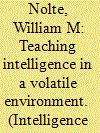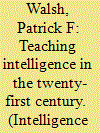|
|
|
Sort Order |
|
|
|
Items / Page
|
|
|
|
|
|
|
| Srl | Item |
| 1 |
ID:
155218


|
|
|
|
|
| Summary/Abstract |
This article is a summation of the emphases I place in my teaching about intelligence, both in academic settings and in courses presented to government and commercial clients. The main goal is to demystify and deromanticize intelligence, to present it as a normal function of government and one that has moral and ethical standards and can exist compatibly within a democratic government. The article also discusses suggested course readings, some successful term paper topics and the concept of graduate intelligence courses as a type of professional training. The article also notes some themes emphasized in courses on training new analysts in their required skill sets.
|
|
|
|
|
|
|
|
|
|
|
|
|
|
|
|
| 2 |
ID:
143752


|
|
|
|
|
| Summary/Abstract |
Over the last decade, intelligence has become one of the most widely taught subjects in higher education. In response to this, a sub-discipline has emerged within Intelligence Studies devoted to thinking about how the subject is actually taught. One of the most common arguments to come out of this literature is that there should be more practitioner involvement in the university teaching of intelligence. However, it is rarely specified what exactly intelligence professionals bring to the classroom, save the largely self-evident point that because they have ‘walked the walk’, they are uniquely qualified to teach the subject. Drawing on student questionnaires, as well as interviews with serving and retired intelligence officers, this article attempts to probe a little deeper and identify the specific benefits of incorporating practitioners into the university teaching of intelligence. It is argued that practitioners ‘put a face on the profession’ and help to remove some of the mystique and misperceptions that surround intelligence work. It is claimed that practitioners, especially with their ‘inside stories’, give added meaning to academic theories and make the subject more exciting. Finally, it is argued that practitioners enrich the broader ‘student experience’. In UK higher education, now under a new fees regime, students are looking for departments to go the extra mile not only in terms of their teaching, but also in areas like careers advice and support. In this context, intelligence professionals are enormously valuable.
|
|
|
|
|
|
|
|
|
|
|
|
|
|
|
|
| 3 |
ID:
155219


|
|
|
|
|
| Summary/Abstract |
The article discusses the development of intelligence studies in recent decades, reflected in many of the characteristics of other disciplines, among them venues for unclassified literature on intelligence, participation in academic conferences, and the significant growth of degree- or certificate-based graduate or undergraduate programs. The article goes on to discuss the need to ensure that the teaching of intelligence reflects changes in the two fundamental environments in which intelligence must operate, that is, an operational environment no longer marked by the predominance of a closed state peer adversary, and an information and information technology environment reflecting the dramatic changes that have taken place – and continue to take place – in that latter environment. Teaching intelligence in these complex and fluid environments will require a careful balance between addressing intelligence structures, processes, and methods that characterized 20th century intelligence with at least the likelihood that many of those fundamentals will require replacement or significant redefinition to meet twenty-first century needs. In these circumstances, teaching intelligence must mean preparing students to operate within – if not to create – an intelligence of the future.
|
|
|
|
|
|
|
|
|
|
|
|
|
|
|
|
| 4 |
ID:
155220


|
|
|
|
|
| Summary/Abstract |
Since 9/11, the ‘Five Eyes’ countries have seen a dramatic rise in intelligence training and education courses across the national security and law enforcement contexts. However, there remains little publicly available empirical evidence to demonstrate specifically where improvements have been made to workplace practices and processes as a result of this investment. This article, argues that the education sector in the intelligence discipline lacks an evaluation research agenda, for validating the workplace effectiveness of training and education programs. Further, a first step in understanding whether curriculum are ‘fit for purpose’ may be articulating some underlying common normative principles for evaluating programs in any intelligence context.
|
|
|
|
|
|
|
|
|
|
|
|
|
|
|
|
| 5 |
ID:
155216


|
|
|
|
|
| Summary/Abstract |
This essay begins with a look at several ingredients – such as subject mastery and careful course planning – that, combined, can lead to effective teaching. It then turns to some classroom activities that have proven to catch the attention of students and help them to learn about the intricacies of national security intelligence. These activities include the preparation of congressional briefing books related to mock hearings on intelligence programs; ‘murder boards’ that sharpen the critiquing skills of students, as well as their ability to speak more forcefully and convincingly; and the use of dramatic scenarios to spark classroom discussions about ethical challenges faced by intelligence agencies.
|
|
|
|
|
|
|
|
|
|
|
|
|
|
|
|
| 6 |
ID:
155213


|
|
|
|
|
| Summary/Abstract |
This article uses our experience of teaching a postgraduate course in Intelligence Studies as a basis for discussion of core issues relating to contemporary intelligence education. After situating our understanding of Intelligence Studies in the context of wider debates about its nature and purpose, the article goes on to discuss key questions of how, who, and what we teach when we teach ‘intelligence’. It discusses the pedagogical benefits of a Distance Learning approach to teaching intelligence. It presents a picture of variegated demand arising from a dynamic and expanding professional sector and the continued appeal of studying the subject to non-professionals. It concludes that in providing ‘education’ rather than ‘training’ and taking a constructivist approach to learning as a shared journey, the ‘Leicester Approach’ can both improve the practice of intelligence and widen participation in key debates about intelligence.
|
|
|
|
|
|
|
|
|
|
|
|
|
|
|
|
|
|
|
|
|